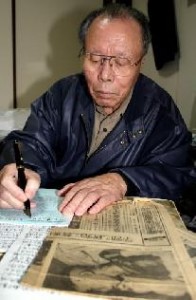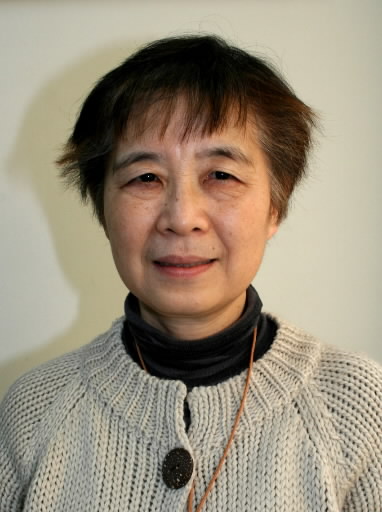Personal histories born of August 6 increasingly common
Feb. 19, 2010
by Toshiko Bajo,Staff Writer
There is a growing trend among atomic bomb survivors and their families to record their personal histories. At a meeting late last year of social workers and others in Hiroshima who offer counseling services to survivors, they were urged to write accounts of their experiences. Looking back over their lives means describing not only the harm inflicted by the war and the atomic bomb but also the subsequent efforts by families and the community to recover and rebuild. The Chugoku Shimbun spoke with people who are recording their experiences.
Even after nearly 65 years, Kenji Kawamoto, 82, is still startled by loud sounds. He can't look directly at the headlights of oncoming cars because it reminds him of the rigidity of his body, which was burned by the thermal rays. Suffering from poor health, Mr. Kawamoto lives alone in an apartment. "The atomic bomb affected my entire life afterwards," he said.
At the time of the bombing, Mr. Kawamoto, now a resident of Shunan in Yamaguchi Prefecture, was digging a bomb shelter near Yokogawa Station, about 1.5 kilometers north of the hypocenter. His entire body was burned and his parents found him near death at the facility where he had been taken. He was unconscious until around October.
In the ensuing years he was in and out of the hospital. He sometimes collapsed at work and had difficulty holding down a job. He never married or had children out of fear of the genetic effects of the atomic bombing.
He was inspired to begin writing his personal history in 2007 after consulting with the Hiroshima Prefectural Confederation of A-bomb Sufferers Organizations and joining a lawsuit to be certified as a sufferer of the effects of radiation. Last spring he prevailed in the first trial. At the end of last year a law was passed that will provide aid to others who lost their suits. "This happened thanks to those who supported us. I want to record my experiences in some form in an effort to repay them," he said.
Among the materials he prepared for the lawsuit is a photo taken by the U.S. military and returned to Japan in which Mr. Kawamoto can be seen. He reads his account over, and then slowly scratches out more in pencil on fresh sheets of paper. He writes in the waiting rooms of hospitals while waiting for doctor's appointments or while sitting beside his bed at home. Then he makes a clean copy.
He has described seeing his burned body in a mirror, muffling sobs in bed and working despite his physical limitations. Not a day goes by that he doesn't look at his scars.
No matter how much time passes he cannot escape his mental or physical scars. That is precisely why he wants to tell people not only about the day of the bombing but also his life afterwards. He writes in the hope that a massacre involving innocent citizens will never happen again.
The Chugoku Shimbun asked Tokyo resident Yoshie Kurihara, 62, publisher of Personal History Newsletter: Hibakusha, about the significance of the writing of personal histories by atomic bomb survivors and their families. Below are Ms. Kurihara's thoughts:
Most of the accounts written by the atomic bomb survivors describe their experiences just before and after the bombing or until their recovery from the acute symptoms of radiation sickness. But that does not represent the full extent of the harm inflicted by the atomic bomb. Later many of the survivors suffered from not only the physical effects of their exposure to radiation but also discrimination and emotional distress related to marriage, work or the birth of children. There was a tremendous impact beyond what the survivors themselves are aware of.
Writing about their experiences is very meaningful. By looking back over their experiences and describing them, they can review their lives and organize their thoughts. It is also useful in helping them lead better lives from now on. Recalling those who died, many recognize themselves as survivors and decide to convey their thoughts and feelings to others.
The accounts inspire sympathy in those who read them. Some people who read A-bomb accounts that record only the time before and after the bombing itself merely think to themselves, "I'm glad it wasn't me" or "That's all in the past." But when they read the survivors' personal histories and sympathize with them, the account leaves a lasting impression, and they can regard the issue as one that concerns them as well.
The writing process is a struggle for some because they are forced to recall painful experiences. In some cases it takes time for people to get past that. They need the support of their friends and families. I would like them to ask questions, offer advice and help the survivors express their feelings more clearly.
Yoshie Kurihara
Yoshie Kurihara is a certified social insurance and labor consultant. She was a staff member of the Japan Confederation of A- and H-Bomb Sufferers Organization from 1980 through 1991. In 1993, she launched the monthly Personal History Newsletter: Hibakusha and sought contributions from writers. To date, the accounts of about 800 people have been published in 205 issues. Currently 640 copies are distributed nationwide.
(Originally published Feb. 9, 2010)
Related articles
Hiroshima Memo: Accounts written by A-bomb survivors must be passed on (Feb. 16, 2010)
To comment on this article, please click the link below. Comments will be moderated and posted in a timely fashion. Comments may also appear in the Chugoku Shimbun newspaper.
There is a growing trend among atomic bomb survivors and their families to record their personal histories. At a meeting late last year of social workers and others in Hiroshima who offer counseling services to survivors, they were urged to write accounts of their experiences. Looking back over their lives means describing not only the harm inflicted by the war and the atomic bomb but also the subsequent efforts by families and the community to recover and rebuild. The Chugoku Shimbun spoke with people who are recording their experiences.
Kenji Kawamoto, Shunan, Yamaguchi Prefecture: Lingering fear of loud sounds and bright light
Even after nearly 65 years, Kenji Kawamoto, 82, is still startled by loud sounds. He can't look directly at the headlights of oncoming cars because it reminds him of the rigidity of his body, which was burned by the thermal rays. Suffering from poor health, Mr. Kawamoto lives alone in an apartment. "The atomic bomb affected my entire life afterwards," he said.
At the time of the bombing, Mr. Kawamoto, now a resident of Shunan in Yamaguchi Prefecture, was digging a bomb shelter near Yokogawa Station, about 1.5 kilometers north of the hypocenter. His entire body was burned and his parents found him near death at the facility where he had been taken. He was unconscious until around October.
In the ensuing years he was in and out of the hospital. He sometimes collapsed at work and had difficulty holding down a job. He never married or had children out of fear of the genetic effects of the atomic bombing.
He was inspired to begin writing his personal history in 2007 after consulting with the Hiroshima Prefectural Confederation of A-bomb Sufferers Organizations and joining a lawsuit to be certified as a sufferer of the effects of radiation. Last spring he prevailed in the first trial. At the end of last year a law was passed that will provide aid to others who lost their suits. "This happened thanks to those who supported us. I want to record my experiences in some form in an effort to repay them," he said.
Among the materials he prepared for the lawsuit is a photo taken by the U.S. military and returned to Japan in which Mr. Kawamoto can be seen. He reads his account over, and then slowly scratches out more in pencil on fresh sheets of paper. He writes in the waiting rooms of hospitals while waiting for doctor's appointments or while sitting beside his bed at home. Then he makes a clean copy.
He has described seeing his burned body in a mirror, muffling sobs in bed and working despite his physical limitations. Not a day goes by that he doesn't look at his scars.
No matter how much time passes he cannot escape his mental or physical scars. That is precisely why he wants to tell people not only about the day of the bombing but also his life afterwards. He writes in the hope that a massacre involving innocent citizens will never happen again.
Interview with Yoshie Kurihara, publisher of atomic bomb survivors' accounts: Awareness of being a survivor, conveying thoughts and feelings
The Chugoku Shimbun asked Tokyo resident Yoshie Kurihara, 62, publisher of Personal History Newsletter: Hibakusha, about the significance of the writing of personal histories by atomic bomb survivors and their families. Below are Ms. Kurihara's thoughts:
Most of the accounts written by the atomic bomb survivors describe their experiences just before and after the bombing or until their recovery from the acute symptoms of radiation sickness. But that does not represent the full extent of the harm inflicted by the atomic bomb. Later many of the survivors suffered from not only the physical effects of their exposure to radiation but also discrimination and emotional distress related to marriage, work or the birth of children. There was a tremendous impact beyond what the survivors themselves are aware of.
Writing about their experiences is very meaningful. By looking back over their experiences and describing them, they can review their lives and organize their thoughts. It is also useful in helping them lead better lives from now on. Recalling those who died, many recognize themselves as survivors and decide to convey their thoughts and feelings to others.
The accounts inspire sympathy in those who read them. Some people who read A-bomb accounts that record only the time before and after the bombing itself merely think to themselves, "I'm glad it wasn't me" or "That's all in the past." But when they read the survivors' personal histories and sympathize with them, the account leaves a lasting impression, and they can regard the issue as one that concerns them as well.
The writing process is a struggle for some because they are forced to recall painful experiences. In some cases it takes time for people to get past that. They need the support of their friends and families. I would like them to ask questions, offer advice and help the survivors express their feelings more clearly.
Yoshie Kurihara
Yoshie Kurihara is a certified social insurance and labor consultant. She was a staff member of the Japan Confederation of A- and H-Bomb Sufferers Organization from 1980 through 1991. In 1993, she launched the monthly Personal History Newsletter: Hibakusha and sought contributions from writers. To date, the accounts of about 800 people have been published in 205 issues. Currently 640 copies are distributed nationwide.
(Originally published Feb. 9, 2010)
Related articles
Hiroshima Memo: Accounts written by A-bomb survivors must be passed on (Feb. 16, 2010)
To comment on this article, please click the link below. Comments will be moderated and posted in a timely fashion. Comments may also appear in the Chugoku Shimbun newspaper.









